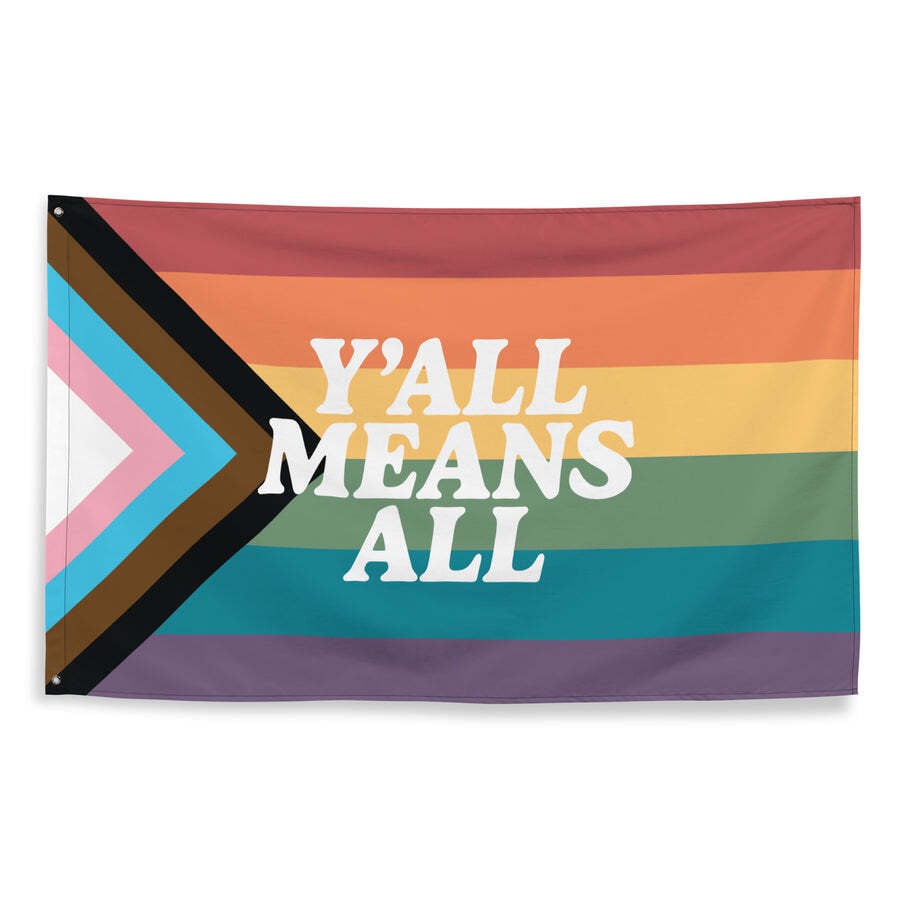If anyone can find more pixels for me i would appreciate it.
Thanks y’all.
I would have thought that “y’all” is even more so gender neutral and therefore less offensive/more accepted. It’s a contraction of “you all” right?
Y’all has become my goto nowadays, up in the northeast
The y’all zone is all zones apparently.
Honestly it’s just so useful. It should be the default.
I picked it up when I lived in Houston, but when I was bartending and stuff after returning to my home state, I’d use it heavily.
Interestingly, though, it made people think I was from another country entirely? Because in absolutely no other way do I sound even remotely southern. (I do use various non-American slang, but not with strangers) Was always a blast to have someone ask where I was from, and try to get them to pinpoint why they didn’t think I was local, when I was born 15 minutes from where the conversation was taking place :p
Yeah, I’m in the “you guys” zone and I say y’all, it’s always better received.
“y’all” fills a legitimately useful gap the English language has. Other languages have a word like this.
Edit: also something cool I just found out, some languages have a way to disinguish “we” (you and I), and “we” (me and the rest of us, not you). It’s called clusivity and is missing from European languages. Many indigenous languages of the Americas and Oceania have this, as well as Vietnamese and northern dialects of Mandarin.
Not a gap in every dialect! “Ye” is another plural second person used in Ireland
Hear y’all hear y’all, Reggie King from o’er the holler brought pawpaw moonshine for the weddin’
And youse in Dublin.
Every dialect has a word for it. There’s no gap.
The worst is when a language formally has a disambiguating word but then speakers all just decide to not use it.
Any examples of an equivalent in other languages?
I speak a small amount of French but can’t think of one
“Vous” is the first one that comes to mind in french. But since it is also a more formal (and/or “respectful”) version of “tu/toi”, it can both designate a group of people or a single person, depending on the context (just like “you” in English). Sometimes people will use “vous tous” (literally “you all”) to make this clear.
It is a little better than the “you” situation in English since if you are speaking with someone that is not using the singular form of “vous” to speak about you (which is basically anyone you are familiar with unless they are your boss or In-laws and kind of oldschool), it is instantly clear what they mean at least.
deleted by creator
Spanish has “Ustedes” (except in Spain, they use “Vosotros/Vosotras”)
deleted by creator
English used to be like other European languages too. We had thou/thee for singular, and you/ye for plural, and for respectful singular. Eventually, people began using it as respectful singular for everyone, and so it just became singular and plural, eclipsing thou/thee. Around this time, the you/ye accusative/nominative distinction was also lost, so now we just have you.
If you’re curious, the you/ye distinction worked like this: “you” was used for the subject (the doer) of the sentence, and “ye” was used for the object (the done to). you/ye are analogous to I/me.
“You come with me.” (plural you)
“I come with ye.” (plural ye)
As a result of the loss of thou, we also lost the conjugation of verbs related to it, like “art” instead of “are”, and “-st” or “-est” for other verbs (“goest”, “thinkst”, etc). It used to be that “are” was only for plural pronouns, but now both “you” and “they” can be singular.
And if you’re curious about what happened to “-eth”, evidence suggests this was for a long time a typographic feature, and it was pronounced “-s” as it is today. It was used exactly like “-s”. “He thinketh” would have been pronounced “he thinks”.
There is also “you lot”
I’m from Australia and I’ve started calling all groups of people yall because it’s gender neutral… very unaustralian term, and I love so much the irony of iconic southern terms being used to support trans activism
I’m German and I use y’all all the time when speaking English. it’s funny, most of my English is from the internet so it’s the most crazy mix of english
Why bother with importing y’all when we already have yous (or youse depending on how you want to spell it)? Or you could just treat ‘you guys’ as gender neutral, it effectively is these days with how people use it.
Youse is too damn bogan for my taste
absolutely this
youse and torlet
Fair enough, it does have associations there. Pretty sure I’d toss y’all in the same basket though if I heard anyone trying to make it a thing…
As an Australian, why bother importing “y’all” when everyone is already “mate”?
I was going to say something similar, but thinking everyone is “cunt”.
Yes, it’s gender neutral.
Too right, mate.
A lot of trans femmes myself included cannot see ‘guys’ as gender neutral no matter how hard we try and so do not like it.
That’s rough. That said as a trans woman (no idea what a trans-femme is) I don’t see a problem with it in the context of “you guys”.
I use “dude” as a general exclamation towards my own also-trans gf sometimes even. Really y’all oughta chill on the language policing. If you pass people will treat you like the gender you look like, if you don’t, they won’t really, no matter how much they try, and your main issue is not passing and thus money which can fix that, not other people and their language use.
Oof. Passing is an archaic concept, just use the language for people that doesn’t make them feel uncomfortable.
A trans femme is someone who tries to make themselves look more ‘femme’ often through taking estrogen etc, it can refer to trans women as well but also refers to those who don’t completely identify or at all as a woman, see nonbinary folks for example. It’s kind of a catch all term.
Who said anything bout language policing? I was merely saying for myself. I think passing is a pointless binary concept and not even all cis women ‘pass’. So I’m not all that interested in passing 100%, just being happy to be me.
I have regularly called groups of females “you guys” since childhood. It’s extremely neutral in a lot of the country.
Okay, but not everybody is going to be comfortable with it and so are you saying you would not change your speech for them?
Also which country?
The US. And yes, I will continue to use the phrase “you guys” because it’s a phrase that means “you people”. I can’t anticipate every illogical thing that will offend people. If someone called me out on it in person I would try not to use the phrase to address them specifically but I would also think they were being very silly.
It always confuses me when people say ‘offend’ people, because usually it is not offense they feel etc.
Well, that’s not a very fair way of treating/thinking of people, some people are going to be hurt or upset by certain things and it’s better to understand that we all have emotions and they are not pointless just because you see no value in them i.e. ‘illogical’. It’s better to work together and find ways of communicating that aren’t genuinely hurtful ioo.
People who claim “guys” is gender neutral would most often only count men when asked the question “How many guys did you sleep with in your life?”
Until I find a single person who immediately thinks of people of any gender at that question, I will not fall for the internalized misogyny of “‘guys’ is gender neutral” meme. (Same with “dudes” and all the other ones I’ve seen over the years. I’ve even seen someone say “bro” is gender neutral.)
Do we have yous/youse? According to my understanding that’s technically not a real word yet, it’s slang.
I feel like y’all is the newer American version of 2nd person plural, while yous/youse/yinz are the non-American English counterparts.
I have always used you guys in a gender neutral manner historically, but people occasionally got offended by that. So I started using y’all several years ago and it’s been going pretty good. Although I did initially spell it like ya’ll until someone corrected me on reddit 😅
You forgot “Yinz”
Yinz goin aht n abaht in dahntahn Picksburgh to watch da Stillers game?
Yinz is definitely a Scots thing
That’s actually “you’uns” and despite being from the deep south I barely ever heard it growing up. Guessing you are from the south too
Yinz is a Pittsburgh and Pennsyltucky thing
Genuine question. What is the “tucky” in pennsyltucky? Is it somehow tied to Kentucky?
Yeah, it’s the area south of Pittsburgh near WV, why is it called Pennsyltucky instead of Pennsylvirginia? No idea.
But, it’s more of a “here be hillbillies” thing, especially when compared to the rest of the state.Not just the area south - basically all the area in between the two cities. And yeah, it’s basically like saying “once you’re out of the cities, you might as well be in Kentucky.”
Kentucky = Hicks
I was editing an Irish comedy recently which used “yinz” and “yiz” a lot.
Wow, this is news to me. How does a new word get the s to change to a z like that??
People where I am from call everyone “you guys” - men, women, trans, doesn’t matter, everyone is just “you guys” even when it’s a woman addressing a group of women.
The literal meaning isn’t gender neutral, but in actual practice, it 100% is.
As for “y’all” or “you all”, I don’t see how it could possibly be interpreted as offensive to any gender.
“You People” is the one to be avoided
“howdy fuckers” is the opposite as it sounds bad on paper but in practice it goes over well (except with middle aged moms)
“G’day cunts” goes over either extremely well or extremely poorly, with no in-between
Ah the classic way to say hello in Australian.
What do you mean "you people"?
Yeah I don’t see that one going over well anywhere
Dude is also situationally gender neutral. Saying “Hey dude” to a trans woman is misgendering her but exclaiming “Yo dude check this out!” or “Duuuude no way” is perfectly acceptable.
As for “y’all” or “you all”, I don’t see how it could possibly be interpreted as offensive to any gender.
I think “we don’t take kindly to y’all” to a trans person would likely be offensive. Beyond that though, you’re probably okay.
“yall” is obviously not the problematic part of that sentence
I might as well double down while I’m here, “we don’t take kindly” was too aggressive wording.
I meant something more neutral like “I think y’all are weird”.
That way, the y’all is the problematic part. That was my point.
Nope, “y’all” is still not the problematic part
Okay, I’ll bite. How is y’all not the problematic part when it’s specifically referring to trans people in that case?
That certainly seems problematic to me.
Literally the entire rest of the sentence is the problematic part. “We don’t take kindly to you”, it doesn’t matter if they say “y’all”, “you all”, “you people”, “your kind”, take your pick, it’s not the problem with the sentence
I mean … Thats just an all out threat with y’all acting as an exclusionary statement.
All in all agree with your point tho.
The literal meaning isn’t gender neutral, but in actual practice, it 100% is.
Unless you can ask a straight man how many guys he’s slept with, it isn’t gender neutral, no matter how resistant to this fact you are.
I don’t see the issue with using the term “guys” in the plural when referring to a group regardless of sex. That would align with the definition of the word. I’m pretty sure that’s how they meant it.
Unless you can ask a straight man how many guys he’s slept with, it isn’t gender neutral, no matter how resistant to this fact you are.
E: the fact that neither of you give a shit about the people telling you the term isn’t gender neutral, doesn’t apply to us, and that we don’t feel comfortable with you using it to speak to or about us says it all. No matter how much mental gymnastics you do to convince yourself otherwise you are the ones choosing to be the problem instead of actually listening to others and showing some basic respect. It’s an easy fix, too - all you have to do is give a minimal fuck about others.
don’t feel comfortable with you using it to speak to or about us
This actually is relevant, but wasn’t part of your initial statement. If you don’t like people using the term to refer to you then people should absolutely make an effort to not use that term when referencing you.
Saying there’s some mental gymnastics on my part is a bit of stretch, it’s how the word is defined in the dictionary. All I needed was to read. There’s no disrespect here, if you don’t like it then using the term to refer to you would be disrespectful, but I haven’t done so.
That’s how people use it, whether you like it or not. I did not invent the language, but that’s how people use it.
Saying “guys” on its own is also not the same thing as “you guys” in regions that do this.
You can shoot the messenger all you like but it is what it is and I have no power over how people in a region use a language, I am merely informing you of that fact.
Yall is the genderless southern hospitality greeting.
No bullshit no hate. Only yall
I’ve used y’all intentionally as a gender neutral term for years in the south.
Lately I’ve even seen “y’all means all” used as a pride slogan in the south.

Awesome! Thanks comrade.
This needs a line going up the Appalachians for the “You-uns” belt.
And somewhere there’s “yinz”.
I was just about to point out that the map is missing a small “yinz” enclave around Pittsburgh/Johnstown
Ok three people have spelled it ,“yinz” here now, is that a thing?
Yep! https://en.m.wikipedia.org/wiki/Yinz
And people who use the term are yinzers
as a trans person, I’m not offended by y’all in the slightest
This statement has strong Bilbo " I like less than half of you as well as you deserve" energy
(No hate, it just struck me as funny)
I lowkey always found that to be a southern type of insult, I could hear Steve Spurrier saying it
I mean, neither “you” nor “all” is a gendered term in any way
Y’all is the opposite of offensive for trans people. I lived in the south for a while, and I now use y’all specifically to be inclusive. I wouldn’t say “you guys” is offensive to trans women, but I would say for me and likely other trans women it briefly brings to mind being misgendered in the past, so I would call it a small kindness to ube as gender neutral as possible.
Yup, I specifically use y’all and recommend it to people (like my parents) to replace gendered phrases, and I’m not from the y’all zone.
Still up for debate, “dude” and “hun/hon”.
*I’m a trans woman also
As a cis male, I’ve exclusively been called “Hun / Hon” by waitresses and gay men.
I’ve not been offended by any of them.
There’s a hidden usage of “hon” from the history of the toxic trans communities message boards to mean “trans women who don’t pass” and is used condescendingly. That usage is basically dead in the water and barely unknown outside of a pretty narrow sliver of the queer community but it can still get you a side eye in some places.
Oof, noted.
I’ll keep that in my head as something to watch for
I feel like I have watched in real time as Y’all has gained usage up in the Canadian Queer community.
I am old enough to still regard “hon” as demi hostile but “dude” seems to be drifting more and more gender neutral. At heart we may all just be ninja turtles all the way down
Thanks comrade
I’m not from the south and use “y’all” all the time. Find it very useful for filling in a gap that English has and slightly faster than saying “you all”. Its gender neutral in my opinion.
Never once thought of it as offensive.
Y’all is gender neutral,
doso I imagine it’s fineEdit: typo lol
We’re talking about Southern US pronunciation so much that I read your comment from “do I” onwards as if it was being spoken like a Southern Belle.
I thought y’all was just a gender neutral term combining you and all.
How would it be wrong or offensive to refer to refer to trans person as “y’all”? Genuine question.
How would it be wrong or offensive to refer to refer to trans person as “y’all”?
“Y’all not welcome in these parts”
You got me there.
I’m from New Jersey and have never heard anyone unironically say “youse guys”. Side note we also don’t call it “Joisey”.
I always thought youse guys was a new york city thing.
Youse guys wanna play stickball?
How you fuckers doing, eh?
I’m from “you guys” but I’ve lived in “y’all” and now I’m forever team “y’all,” regardless of where I’m living.
It’s the best export from the south, except maybe Texas brisket and pecan pie.
…y’all roughly correlates with coke, although there are some deep pockets of soda-water in the back country…































